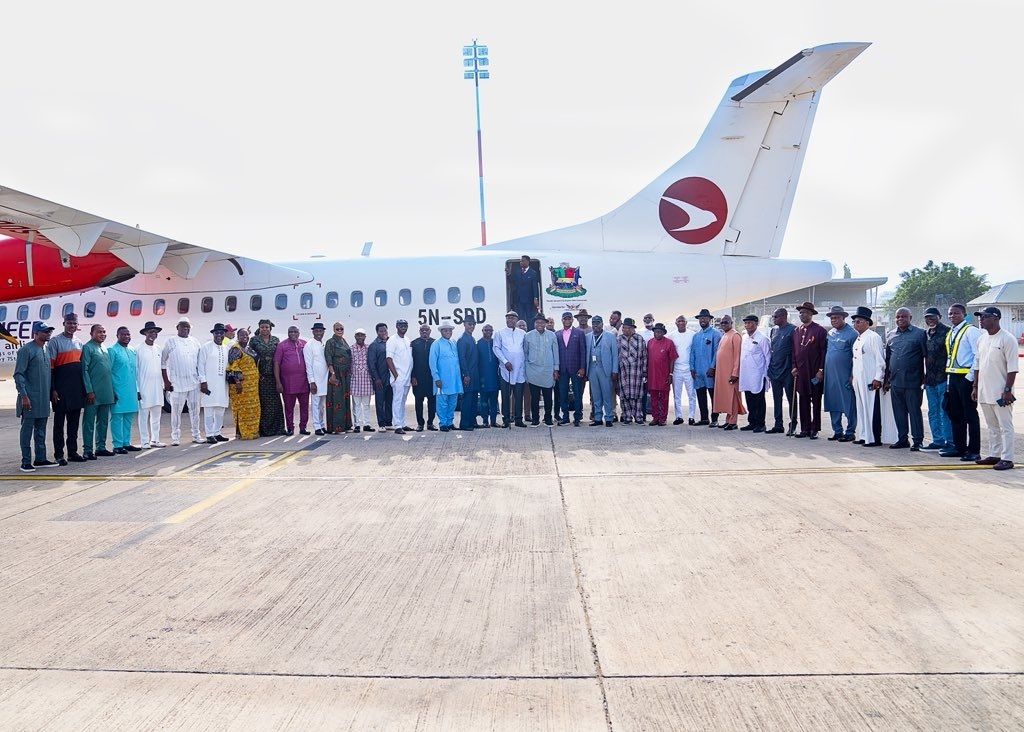
*Laments FG, Senate’s delay in taking prompt action earlier
*Recommends high-level lobbying Involving seasoned diplomats
Sunday Aborisade, Abuja
Senate Leader in the 8th National Assembly and former Chief Whip in the 10th Senate, Senator Ali Ndume, has urged the President Bola Tinubu administration to urgently open diplomatic channels with Washington following the United States’ designation of Nigeria as a “Country of Particular Concern” (CPC) over alleged persecution of Christians.
Ndume, who represents Borno Central Senatorial District, warned that failure to address the issue swiftly could have grave diplomatic and economic consequences for Nigeria, including sanctions, restrictions on security cooperation, and damage to the nation’s global image.
His reaction followed U.S. President Donald Trump’s recent post on his Truth Social handle, later shared on the official White House X account, declaring Nigeria a “country of particular concern” due to what he described as “an ongoing Christian genocide.”
Trump had claimed that “Christianity is facing an existential threat in Nigeria,” alleging that thousands of Christians were being killed by “radical Islamists” and calling for an immediate congressional investigation into the matter.
Trump wrote, “When Christians, or any such group, are slaughtered like is happening in Nigeria (3,100 versus 4,476 Worldwide), something must be done. I am hereby making Nigeria a ‘country of particular concern.’”
Under U.S. law, a “Country of Particular Concern” is one whose government has engaged in or tolerated severe violations of religious freedom or human rights. Such a designation carries serious implications, including visa bans for senior officials, suspension of security assistance, restrictions on arms sales, and limits on trade or aid.
The designation could also impact Nigeria’s bilateral relations and its access to multilateral funding from international institutions that often align with U.S. foreign policy priorities.
Nigeria was first placed on the CPC list in 2020 during Trump’s presidency but was delisted under the Joe Biden administration. Its reinstatement, now under Trump’s renewed influence in Washington, signals a potential return to strained diplomatic relations between the two countries.
In a statement he personally signed and released in Abuja on Saturday, Ndume, who was Chairman of the Senate Committee on the Army in the 9th Assembly, accused both the Federal Government and the Nigerian Senate of failing to act promptly after U.S. Congressman Riley Moore raised the same concern weeks earlier.
Ndume said, “I have alerted the government before now; I even moved a motion in the Senate.
“Nigeria is a sovereign state, but we cannot afford to ignore this kind of misrepresentation. It’s not about what the United States can do to us, but the misconception and the ripple effects of classifying us as a country of concern.”
The senator said the government’s lack of proactive engagement gave room for the U.S. to act unilaterally without hearing Nigeria’s side of the story.
Ndume said, “We should engage the American government by presenting facts and figures. We should demand that they hear from the Nigerian government and from the Muslim community.
“The killings are not targeted at Christians alone, Muslims and other Nigerians have also been victims. The violence is driven by terrorism, not religion.”
Ndume urged the Tinubu administration to deploy Nigeria’s most experienced diplomats and international statesmen to lead the engagement with Washington and other global actors.
He said, “Before things get out of hand, Nigeria should engage seasoned diplomats like Chief Emeka Anyaoku, Professor Bolaji Akinyemi, Babagana Kingibe, Professor Ibrahim Gambari, and Amina Mohammed of the United Nations.They can help us explain the realities on the ground.”
He further advised the government to work closely with the U.S. embassy in Abuja, noting that American officials based in Nigeria already possess credible intelligence on the complexity of the country’s security situation.
Ndume said, “We can change the narrative by ensuring that Nigeria is not tagged a ‘country of particular concern’ but perhaps a ‘country of special concern, one that needs support and partnership.
“That way, the U.S. can assist us with arms, intelligence, and other resources to combat terrorism more effectively,” he added.
Experts and analysts had argued that Nigeria’s re-designation could affect ongoing military cooperation with the U.S., particularly in the fight against Boko Haram and the Islamic State in West Africa Province (ISWAP).
The move may also influence future foreign investments and travel advisories, affecting Nigeria’s global economic outlook.
Diplomatic observers, however, noted that the U.S. decision could still be reversed if Abuja demonstrates measurable commitment to addressing issues of religious violence, human rights, and protection of minority groups.
Ndume, who is from the Boko Haram-ravaged communities in Bornu State, emphasized that while the U.S. has the right to express concern over human rights, Nigeria must defend its sovereignty and reputation through facts and diplomacy.
He said, “The good thing about America is that if they know the truth, they will stick to it. Our government must not be passive. We must engage them constructively, clear the misconceptions, and reaffirm that Nigeria remains a nation committed to religious freedom and peaceful coexistence.”
As Abuja weighs its next steps, the controversy underscores the delicate balance Nigeria must maintain, between acknowledging its internal security challenges and protecting its international image in an era of heightened global scrutiny.


